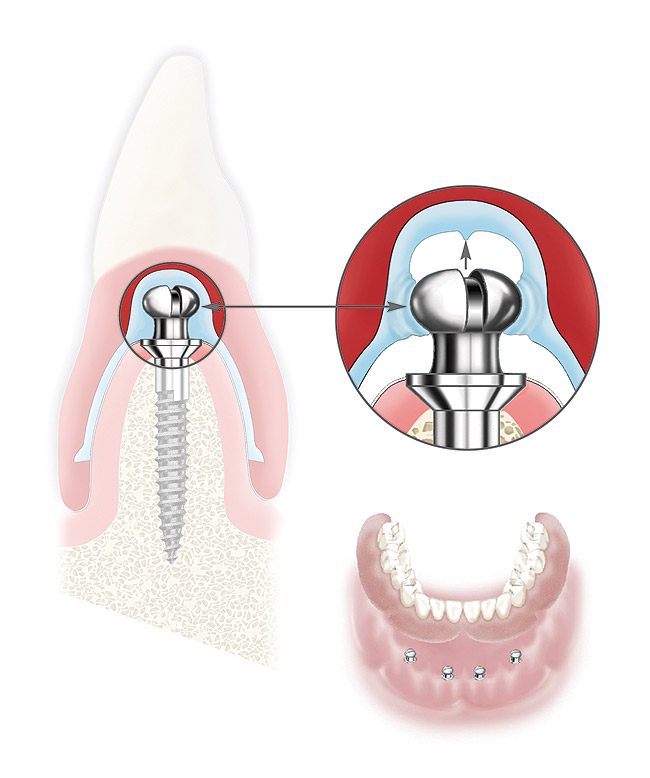Atlas® Denture Comfort™ System
The implant overdenture system is considered a high standard treatment for edentulous patients.

The Atlas® Denture Comfort™ System, developed by Dentatus, eliminates the well-known difficulties of combining retention and comfort in a way that is simple and amenable to clinicians and their patients. The design of the Atlas System considers all aspects of edentulism and eliminates the deficiencies of conventional technologies. It has the potential to provide affordable comfort to the estimated 50 million edentulous patients in the United States alone.
Atlas Ti-Alloy implants are FDA-approved for long-term use. The Denture Comfort protocol most often does not require surgical incision and, consequently, no sutures. In addition, patients can walk out of the office wearing their refitted denture right away. Available in 1.8-mm, 2.2-mm, and 2.4-mm diameters, they can be placed in thinner, atrophic ridges without the need of lengthy grafting procedures. The Atlas implant system is designed to overcome the financial, physical, and time limitations affecting a large number of patients.
Atlas Implants ( Figure 1) have a surface-treated thread and a smooth extension that interfaces with the mucosa, preventing plaque adhesion. The smooth platform is designed to prevent accumulation of food particles and allows for easy hygiene maintenance. The prosthetic wide dome-keeper head functions as locators and provides retention for the denture.
The denture is retrofitted to create an inverted seamline for encasing the Tuf-Link silicone reliner, eliminating the need for adhesives and tolerating the implant positions at diverging angles. The resilient Tuf-Link material grasps on and around the implant’s dome-keeper providing a cushioned fit, all in less than an hour. This design feature is considered to be significantly beneficial to both clinicians and patients as the Tuf-Link can be lifted out to scissor away excess material and returned into its self-aligning position and hermetically encapsulated in the base. The easy removal of the liner, as opposed to having liners that are attached with various adhesives, prevents bacterial infestation and odor accumulation that occur at the denture interface of bonded liners. The denture can be kept in the mouth during the night and its easy removal makes it possible for patients for sufficient dexterity to clean it daily with approved cleaners.
Another important feature design of long-term function is that the liner can be quickly replaced in a 15-minute procedure when ridge atrophy change occurs, without cutting away bonded liners causing changes of the denture fit that need multiple adjustments to correct the denture alignment.
While manufacturers need to be concerned with cost/profit ratios, the Dentatus Atlas design project was governed primarily by patients’ needs of safety, function, and comfort. When the project was completed, Dentatus cooperated with a number of university teaching centers that tested and compared the results with other existing devices for denture retention, and some of these centers have become routine users of the Atlas Denture Comfort system. A recent 5-year study published by Cho and associates of New York University reported 100% patient satisfaction with the Atlas Denture Comfort system.1
Dentatus has developed a highly successful half-day HOW™ Hands-on Workshop to learn the Atlas Denture Comfort technique. Participants will learn to install four Atlas® implants in a model, retrofit the denture base, and reline it with the Tuf-Link® Silicone material. Participants keep the model with the retrofitted denture for staff training and patient education.
What Atlas is Not
Atlas® Denture Comfort™ Technology does not require parallel implant alignment or deep spaces in the denture base for copings with O-ring components that are attached with auto-cure resin. Atlas denture patients do not need to be instructed on how to align the denture insertion or use specially fashioned instruments or spoons to remove them. Atlas patients do not need to have multiple fit adjustments or need relief from lesions caused by guided insertion, especially over uneven and bulbous ridges. Dentists who have not yet used the Atlas® Denture Comfort™ system will discover the great opportunities of professional satisfaction and their patients’ happy smiles of gratitude.
Conclusion
Atlas Ti-Alloy implants were developed in conjunction with New York University College of Dentistry, Department of Implant Dentistry, to be a simple and affordable alternative to conventional implant-supported dentures. Atlas Denture Comfort System is exclusively distributed in the United States and Canada by Henry Schein Dental. ANEW and MTI Monorail Implant Systems continue to be available from Dentatus USA and Dentatus AB Sweden.
Reference
1. Cho S, Froum S, Tai CH, et al. Immediate loading of narrow diameter-implants with overdentures in severely atrophic mandibles. Prac Proced Aesth Dent. 2007:19(3):167-174.
For more information, contact:
Dentatus USA
Phone: 800-323-3136
Web: https://www.dentatus.com
Disclaimer
The preceding material was provided by the manufacturer. The statements and opinions contained therein are solely those of the manufacturer and not of the editors, publisher, or the Editorial Board of Inside Dentistry. The preceding is not a warranty, endorsement, or approval for the aforementioned products or services or their effectiveness, quality, or safety on the part of Inside Dentistry or AEGIS Communications. The publisher disclaims responsibility for any injury to persons or property resulting from any ideas or products referred to in the preceding material.




